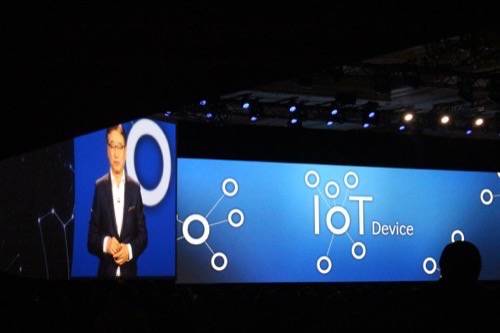With Google’s I/O developer conference around the corner, you can expect the rumors to start coming thick and fast, and The Information has the scoop that the Mountain View company is working on a new OS for the Internet of Things.
It’s codenamed “Brillo” for now, though it emerge under the Android brand, reports The Information. It will be able to run on as little as 64MB or 32MB of RAM, with or without a screen.
Those minimum specs explain the need for a whole new OS for the fledgling Internet of Things—these lightweight, low-powered, low-cost devices don’t have the processing oomph to run Android or iOS.
The Internet of Things may be a clunky title, but no one has yet come up with a better phrase to describe the smart lightbulbs, doorbells, fridges, washing machines and other gadgets that are rapidly invading the home—all of which need software to operate and get online.
Anyone expecting a clean and open fight to become the dominant software provider is likely to be disappointed. At this point, in fact, the best we can hope for is that the companies’ competing formats all decide to play nicely with one another. But where’s the profit in that?
Runners And Riders

Last week Samsung unveiled its Artik family of products, a series of modules and an underlying platform to power IoT innovation. The South Korean firm has been particularly active in the field, gobbling up independent startup SmartThings last year.
Also last week we heard about Qualcomm’s “Internet of Everything” strategy, combining both a series of chips as well as a software platform called AllJoyn. The company promised to play nicely with other standards, but—like everyone else—would prefer its own standard to win out.
The most recent runner to declare was Huawei, unveiling its LiteOS operating system only a few days ago. Just 10KB in size, it supports zero configuration, auto-discovery and auto-networking—in other words it just works, as long as you have other LiteOS-compatible equipment at home.
Those are three major moves in the last seven days, on top of initiatives already in progress from Intel, Apple, Microsoft and others. Confused yet? Your smart desk lamp probably will be.
It’s still early days to talk about interoperability, with so many systems yet to launch or in the nascent stages of development. Many firms are likely to hedge their bets by supporting multiple partners. Even Apple might have to work with more third-party manufacturers than it usually likes to.
Even for those on the inside, it’s difficult to get a handle on this shifting landscape, and it’ll be a while before consumers come to know or care about the capabilities of these Internet-of-Things OSes. Right now it’s about companies setting their stalls out, and you can expect Google to open the shutters before I/O is out.
Lead photo by Anita Hart; Samsung photo by Adriana Lee for ReadWrite

















